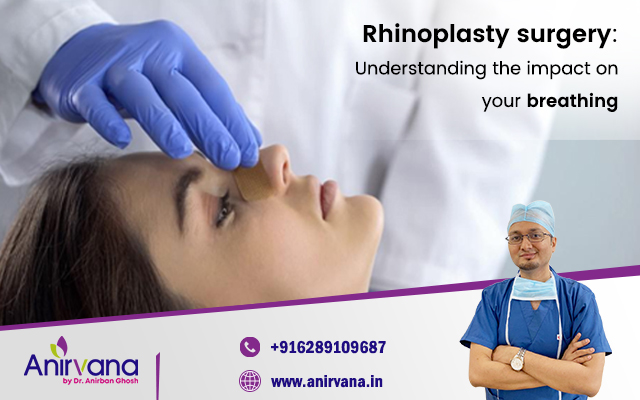Rhinoplasty surgery, also known as a “nose job,” is a cosmetic procedure that is performed to reshape and improve the appearance of the nose. It can also be done to correct structural abnormalities that affect breathing such as a deviated septum.
However, there is a common concern that this surgery can have a negative impact on breathing. In this blog, we will discuss whether rhinoplasty surgery has a long-term impact on your breathing.
Are there any long-term effects on breathing after rhinoplasty surgery?
While rhinoplasty surgery is primarily an aesthetic treatment to improve the appearance of the nose, it can also have benefits that can improve your breathing.
During rhinoplasty surgery, the surgeon may alter the internal structures of the nose to improve airflow and address any breathing problems the patient may be experiencing. This can involve reshaping the septum, which is the thin wall that separates the nasal passages or reducing the size of the turbinates which are small structures inside the nose that help to filter and humidify the air.
However, in rare cases, some patients may experience breathing problems after the procedure if it is performed by an inexperienced plastic surgeon. Hence, it is always advisable to choose a board-certified plastic surgeon in Kolkata who has extensive experience performing rhinoplasty and a proven track record of successful outcomes.
What are the potential changes in breathing soon after undergoing rhinoplasty surgery?
It is common for patients to experience some changes in their breathing soon after rhinoplasty surgery. Swelling and congestion in the nasal passages can cause discomfort for the first few days after the procedure. However, as the swelling subsides and the tissues heal, most patients will begin to notice an improvement in their breathing over time.
Here are some common post-operative instructions which you need to follow after this aesthetic treatment.
Keep the head elevated: Sleeping with your head elevated can help to reduce swelling and promote healing. Your surgeon may recommend using several pillows to keep your head elevated while sleeping.
Apply cold compresses: Applying cold compresses to the nose and face can help to reduce swelling and bruising. Your surgeon may recommend using a cold compress for 10-15 minutes, several times a day.
Avoid blowing the nose: It is important to avoid blowing the nose for several weeks after surgery to avoid putting pressure on the nasal tissues and interfering with the healing process.
Take medications as prescribed: Your plastic surgeon may prescribe pain medication and antibiotics to help manage pain and prevent infection.
Conclusion
It is important for patients to discuss their individual concerns and goals with their surgeon and have a thorough evaluation of their nasal function before undergoing the procedure.
Patient Review
“Humble nature and good behavior .”
- TESLA POINT

